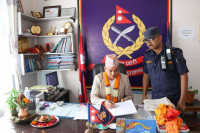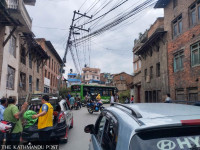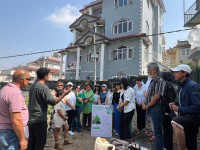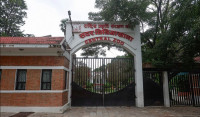Lalitpur
Rs 450 million handed over to Sajha Yatayat to purchase electric buses
Province 3 government announces to operate electric buses in Kathmandu within the next 10 months.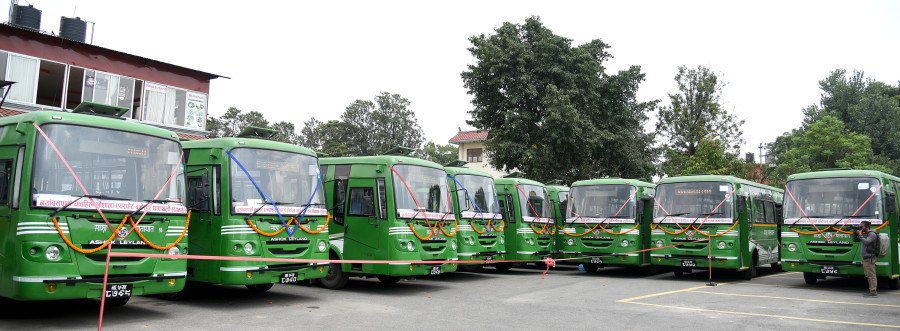
Anup Ojha
Province 3 government and the Lalitpur Metropolitan City handed over capital to the Sajha Yatayat Co-operative on Monday to purchase electric buses.
At a programme in the capital, the province handed over a cheque of Rs 300 million and the Lalitpur Metropolitan City handed over Rs 25 million to the cooperative to kickstart the operation.
Minister for Economic Affairs and Planning of Province 3 Kailash Prasad Dhungel, Mayor of Kathmandu Metropolitan City Bidya Sundar Shakya, Mayor of Lalitpur Metropolitan City Chiri Babu Maharjan, and Chairperson of Sajha Yatayat Co-operative Kanak Mani Dixit signed a four-party memorandum of understanding to buy the new electric buses.
During the programme, a total of 450 million was handed over to the cooperative to buy new electric buses—with the Kathmandu City announcing that it would hand over Rs 100 million to the programme and Sajha Yatayat announcing it would add Rs 20 million.
It was also announced that the electric buses will run into operation in the Valley within the next 10 months. It is estimated that 30 electric buses will be purchased after announcing a global tender.
This is however not the first talk regarding buying electric buses. The government in December last year had announced that it would purchase and operate 300 electric buses in major cities, but the announcement never took off.
Addressing the four-party signing programme Chief Minister Dormani Paudel said the ceremony is the beginning of a new era for electronic buses. “A year ago, the provincial government had announced to operate public electric buses in the core city areas. Today the initiation has started,” said Paudel. He further requested all the stakeholders to discourage the operation of fuel energy running vehicles.
“Within two years, Nepal is going to generate more than enough electric power. And channelising this energy into electric buses will help create a clean and green city. It will also immensely help our economy,” said Paudel. Paudel also announced that the provincial government is working to install charging stations from Kathmandu to Hetuda.
For the operation of the electric vehicles in the coordination of provincial and local government, Kulman Ghising, the managing director of Nepal Electricity Authority, has vowed to facilitate in purchasing charging equipment and to establish charging stations in various locations.
Speaking at the programme, LMC mayor Maharjan said the new drive is going to transform the Valley’s transportation system. “For the past two years, people criticised us for not doing any substantial work. The time has now come to show our work,” said Maharjan.
At the same programme, the cooperative unveiled 20 Euro-4 buses that will be operated on three different routes in the Kathmandu Valley. Of the 20 buses, six will operate between the Naya Bus Park and Suryavinayak route, another six buses will operate in the Naya Bus Park-Kamal Vanayak route and eight buses will operate in the Naya Bus Park-Lagankhel-TIA route. For the new buses, the KMC had invested Rs 60 million and LMC has invested Rs 10 million.
During the programme, the cooperative also officially unveiled its smart travel card ‘Yatra Card’, which can be used by passengers on all its buses. “After two years of failed attempts, we have finally launched the smart card in our all buses. With this new measure, we hope to make transportation more transparent,” said Bhusan Tuladhar, executive director of Sajha Yatayat.
With these new buses, the Sajha has a total of 71 buses on its fleet. Earlier the cooperative had been operating 51 buses in 10 different routes in the Kathmandu Valley, with two routes in and out of the valley: the Kathmandu-Waling route and the Kathmandu-Butwal-Bhairawa route




 16.33°C Kathmandu
16.33°C Kathmandu.jpg)
